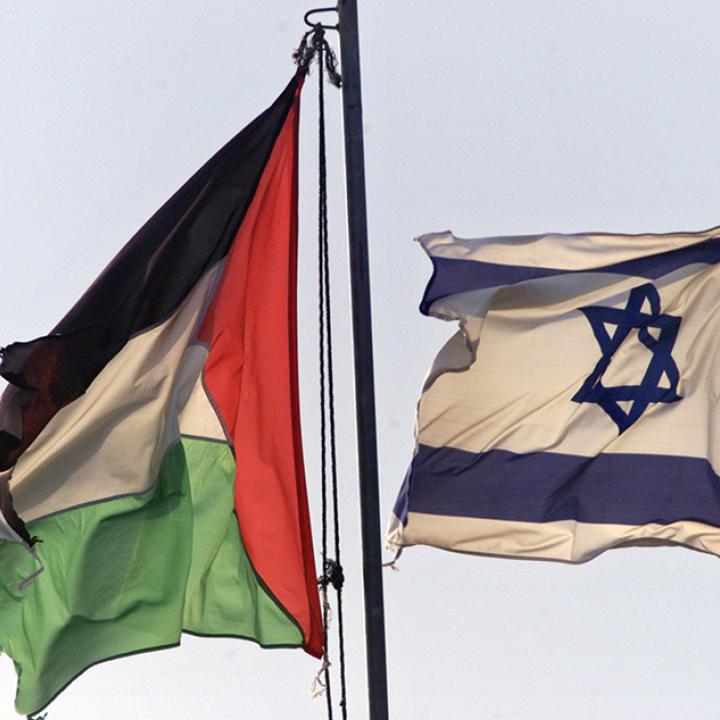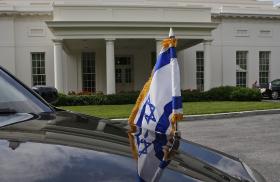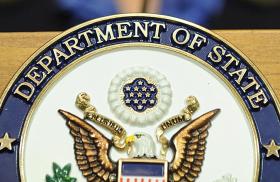
- Policy Analysis
- PolicyWatch 4070
Accelerating Israeli-Palestinian Diplomacy After the Iran War

Although international frustrations over the Gaza war were briefly placed on the back burner during the Iran crisis, they are boiling over once again and may spoil Washington’s postwar plans if left untended.
Now that armed hostilities between Iran, Israel, and the United States have come to an apparent close, diplomatic pressure surrounding the Palestinian issue is building up again. Washington’s action against Iran’s nuclear program puts it in a strong position to shape this emerging international and regional approach. A sound American-led initiative would address not only the situation in the Gaza Strip, but also the wider Israeli-Palestinian conflict; indeed, the upcoming meeting between President Trump and Prime Minister Binyamin Netanyahu provides a good opportunity to begin outlining such a policy. Yet the window for effective action is finite—absent a clear, proactive U.S. policy toward the conflict, international diplomacy may evolve in ways that complicate American interests, including the Trump administration’s goal of expanding the Abraham Accords.
Impact of the Iran War
Before Israel and the United States attacked Iran, European states—even traditional allies of Israel—were growing increasingly frustrated with the collapse of the Gaza ceasefire, the resumption of destructive combat there, and the worsening situation in the West Bank. Their diplomatic statements became harsher toward Israel, and some governments imposed sanctions on Israeli ministers and began to rethink plans for wider bilateral cooperation. Similarly, Israel’s Arab peace partners were alarmed by developments in Jerusalem and the West Bank—in May, for example, the United Arab Emirates took the rare step of summoning Israel’s ambassador to Abu Dhabi to protest developments in East Jerusalem. Meanwhile, Saudi Arabia and France were in the process of convening a diplomatic conference to reinject energy into the two-state solution and possibly secure recognition of a Palestinian state—notably, without Israel’s participation or assent.
The Iran war affected all of these developments: Europe rallied in support of Israel’s right to defend itself, Arab states were consumed with concerns about regional stability, and the two-state conference was postponed indefinitely. Now that the dust has settled, the Trump administration has acquired tremendous political capital in Israel after providing such robust military and diplomatic help. And while Arab states are still concerned about the future repercussions of striking Iran, the use of force (particularly in a way that did not widen the conflict) sent a strong signal that the United States remains the primary international actor in the region.
At the same time, however, alarming reports about Israeli-Palestinian deterioration are coming back to the fore, including the worsening humanitarian situation in Gaza, escalating settler violence, and growing momentum in Israel for annexing the West Bank. European countries are once again expressing frustration with the situation, and efforts are under way to revive the postponed two-state conference. Without intervention and clarity from Washington, these developments will take their own (potentially counterproductive) course.
How to Tackle Gaza
Ending the Gaza war is an immediate priority and a prerequisite for further diplomacy. Although the Iran war has created a new opening to work toward a Gaza ceasefire, many of the same complicating factors that preceded the war still exist.
First and foremost, no ceasefire will be possible without the release of Israeli hostages and commitments to disarm Hamas and remove it from power. The final say on these matters rests with Hamas commanders on the ground in Gaza, who have been largely impervious to foreign pressure so far. At minimum, however, the United States should insist that Qatari and Egyptian mediators push Hamas’s external leadership to accept these conditions publicly, which could increase pressure on the group’s Gaza leadership. Washington should also demand a clear, public position from key Arab states regarding disarmament. Palestinian Authority President Mahmoud Abbas endorsed this position in a June letter to Saudi Arabia and France, giving Arab states Palestinian cover for endorsing it themselves.
Second, ending the war requires a “day after” plan with clear details about not only the desired future of the devastated Strip, but also the roles and responsibilities of various actors. Some Arab states have already indicated a willingness to play a significant role, but they will have little incentive to commit resources and personnel to Gaza unless Israel (1) provides guarantees that it will not occupy the Strip indefinitely, and (2) removes its veto on a PA role in Gaza’s future, even if only symbolic at first. Arab officials are also seeking assurances that any role they play in Gaza will be in the context of a wider effort to reach a two-state solution.
In return, Arab states need to move beyond the minimalist approach that was evident in the Arab League’s March plan for Gaza. Instead, they need to explicitly articulate their responsibilities with regard to disarming Hamas, playing a security and governance role in Gaza, and rebuilding the PA’s credibility and capabilities.
Addressing the Wider Conflict
European, Arab, and Palestinian officials have made it increasingly clear that urgent efforts to end the Gaza war can no longer be completely divorced from broader efforts to address the Israeli-Palestinian conflict. The Trump administration’s response to these entreaties will need to balance a number of factors.
On one hand, a meaningful U.S. policy must address concerns about the future of the two-state solution. President Trump’s January 2020 peace proposal endorsed the two-state approach, and reaffirming it today would help move things forward, even if the specifics of his proposal prove controversial.
On the other hand, Washington must remain mindful that current conditions between Israel and the Palestinians are not remotely conducive to actually implementing a two-state solution. Thus, any diplomatic effort to reaffirm the ultimate two-state goal must make clear that this outcome will not happen until major obstacles are overcome and key preconditions are met. Declarative pronouncements about peace horizons are important, but the focus should be on concrete, realistic policies linked to clear, verifiable benchmarks.
Such an approach will also require certain concessions and commitments from Israel. Some would be declarative, regarding acceptance of the two-state solution in principle. Just as important, Israel will need to refrain from actions that preclude the possibility of a future Palestinian state, including unilateral annexations in the West Bank outside the framework of an agreement, settlement expansion outside the “blocs,” and policies that threaten to collapse the PA. Besides obstructing longer-term peace efforts, such actions could lead to sharp diplomatic escalation with Arab and European governments, thereby impeding near-term efforts to resolve the Gaza situation. Annexation in particular would have far-reaching consequences for Israel’s current and future relations with Arab states.
Washington must press for Palestinian and Arab commitments as well—not just clear statements and actions against terrorism and incitement, but also serious efforts to reform the PA and build healthy institutions. On the latter issue, the focus should be on guaranteeing that a future Palestinian state will not be doomed to failure or capable of threatening Israel and its neighbors. Arab states must understand that simply articulating what Israel and the United States “need to do” is no longer enough—they must take it upon themselves to deliver Palestinian commitments through more active engagement and pressure. Arab states have been good about publicly demanding Palestinian reform, but so far they have been unwilling to push the PA leadership beyond merely symbolic changes.
The exact format of the U.S.-led effort is secondary—it could be a traditional diplomatic “initiative,” a new contact group, and/or an international conference (whether a new one organized by Washington or a reshaped version of the postponed Saudi-French conference). Or it could take the form of a presidential pronouncement. What matters more is that Washington clearly articulate the objectives it expects the other actors to abide by.
Also important is the need to back up this policy by designating and empowering an official U.S. “address” for follow-up and implementation. The Gaza ceasefire negotiations were entrusted to special envoy Steve Witkoff, one of the most influential figures on the administration’s foreign policy team, signaling that the president saw this effort as a priority and ensuring effective follow-up. A similarly empowered U.S. appointment is required today to take control of Israeli-Palestinian diplomacy and ensure that European and Arab steps support rather than undermine America’s wider regional objectives.
Ghaith al-Omari is the Gilbert Foundation Senior Fellow at The Washington Institute.



